|
Sri Lanka Police celebrate150 years of service :
UPHOLDING THE LAW
by Dishan Joseph
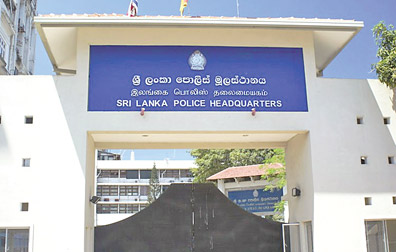 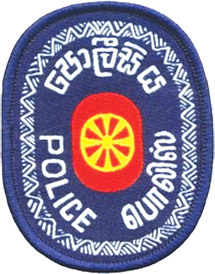 It is the implementation of the Law that sustains our society.
Upholding the Law with impartiality remains a rather daunting
challenge.The year 2016 marks a grand milestone as the Police Service
can take pride in celebrating 150 years of service to the people of Sri
Lanka. It is the implementation of the Law that sustains our society.
Upholding the Law with impartiality remains a rather daunting
challenge.The year 2016 marks a grand milestone as the Police Service
can take pride in celebrating 150 years of service to the people of Sri
Lanka.
It has been a long journey with onerous demands, including threats of
insurgencies and violent acts of terrorism that were met with courage
and efficiency. There were indeed darker moments of uncertainty, at
times infused with politically orchestrated drama, yet, the gallant
progressive march of the Police continues with new zeal.
For centuries, we have existed as a nation of peace embracing
citizens living in communal harmony, accepting our rich ethnic
diversity. During the Portuguese invasion and control of Ceylon, they
did not perceive the need for a uniformed Police service. Subsequently,
the Dutch gained total control of the Maritime Provinces and the
Northern peninsula by 1658. They focused attention on propagating
religion and building schools, while maintaining order was part of the
duty entrusted to the military.
 The Colombo Municipality initiated a system of hiring paid guards to
patrol the Colombo city at night, as minor offences of theft began to be
reported. Three stations were set up in the busy areas of Fort, Pettah
and at Kaymans Gate. Once the British began to administer Ceylon, the
Office of the Fiscal was bestowed with the supreme authority to
supervise Police duties. As the city grew rapidly the Fiscal was unable
to efficiently administer the Police functions entrusted to him. The Colombo Municipality initiated a system of hiring paid guards to
patrol the Colombo city at night, as minor offences of theft began to be
reported. Three stations were set up in the busy areas of Fort, Pettah
and at Kaymans Gate. Once the British began to administer Ceylon, the
Office of the Fiscal was bestowed with the supreme authority to
supervise Police duties. As the city grew rapidly the Fiscal was unable
to efficiently administer the Police functions entrusted to him.
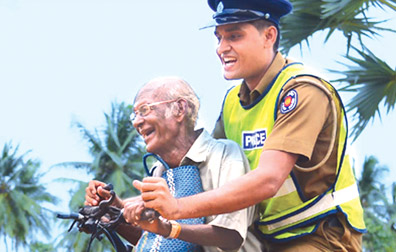 Governor Fredric North, using his visionary foresight began to
redefine the functions and duties of the Police in 1805. A Police Vidane
(officer) was appointed in rural villages solely for the prevention of
crime. Governor Fredric North, using his visionary foresight began to
redefine the functions and duties of the Police in 1805. A Police Vidane
(officer) was appointed in rural villages solely for the prevention of
crime.
Governor North directed that the Colombo city be divided into 15
administrative divisions, by which we are demarcated even today. Police
Constables were recruited and trained.
The defiant Governor was keen to restructure the Police service and
made a request to the Governor of Bombay to recommend a diligent officer
who would lead the new force. The name of W.R. Campbell, who was in
charge of the Rathnagiri Rangers, was proposed and accepted. Campbell
arrived in Ceylon and assumed duties as the first Chief Superintendent
of Police on September 3, 1866. Therefore, this date is recorded as the
day that the uniformed Police Force was established in our nation.
In 1867, the first Police Headquarters was set up in Maradana, where
the Maradana Police Station still operates. Mr. Lokubanda Dunuwila
became the first Sri Lankan to be appointed to the rank of
Superintendent of Police, and was deployed to head the Kandy range.
Ceremonial tunics
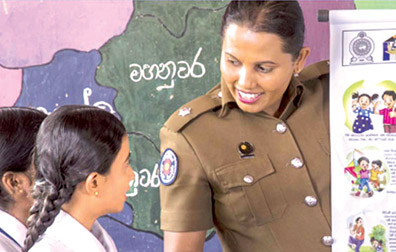 In Colombo, the ranks were restructured to recognize Police
Inspectors, Sergeants and Constables. For the first time in resplendent
Ceylon, the rank of Assistant Superintendent of Police (ASP) was created
and gazetted. The Criminal Investigation Department (CID) was initiated
in 1870. In Colombo, the ranks were restructured to recognize Police
Inspectors, Sergeants and Constables. For the first time in resplendent
Ceylon, the rank of Assistant Superintendent of Police (ASP) was created
and gazetted. The Criminal Investigation Department (CID) was initiated
in 1870.
Empowering the officers to effectively mitigate violent threats .22
caliber rifles were introduced into active service in 1916. Today, the
officers have the advantage of high velocity fully automatic rifles and
handguns.
During the 1920s the Police stables were set up in Pettah, while the
Mounted Division was restructured in 1956, as the horses and men dazzle
us even today in their ceremonial tunics. The Police Headquarters was
shifted to Fort in 1932 where it operates to this day.
In 1947, Richard Aluvihare made history by becoming the first Sri
Lankan to be appointed Inspector General of Police in a service once
dominated by British Officers. He is credited with transforming the
force and introducing the Police Kennels division, which has played a
pivotal role in apprehending criminals, detection of concealed narcotics
and explosives.
Heroic sacrifice
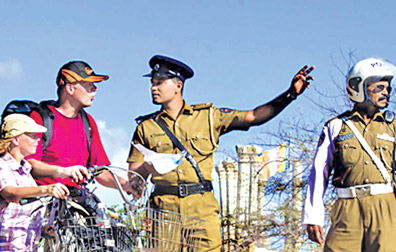 IGP Aluvihare recruited female cadre into the regular service for the
first time, another important hallmark for the Police in fostering
gender equality, as women officers rose to serve in the ranks of SP/ASP. IGP Aluvihare recruited female cadre into the regular service for the
first time, another important hallmark for the Police in fostering
gender equality, as women officers rose to serve in the ranks of SP/ASP.
As vehicles began to converge on the once quiet streets of Colombo,
the Traffic Range was set up and today, has blossomed into a unit with
our very own highway patrol. In 1952, for the first time VHF Radio was
introduced to connect all stations. It was decided during this year that
officers who died while on duty would be accorded a funeral with full
Police honours in recognition of their heroic sacrifice.
The menace of illegal narcotics began to filter into our region,
mainly by sea routes. Thus, the Narcotic Prevention Bureau was set up in
1973. However, illegal drugs continue to somehow invade and enslave many
of our youth in spite of some brilliant detections made by undercover
officers of the PNB and the STF.
Outstanding prowess
During the darker chapters of Sri Lankan history, we were plagued
with many forms of insurgency. To counter this, the department
established the Special Task Force in 1983.
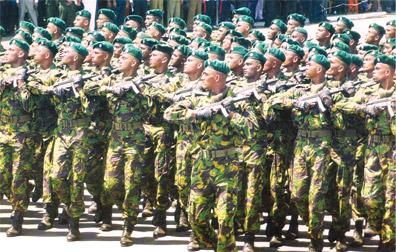 The first batch of officers received training in jungle warfare and
counter terrorism from the SAS (British) and today, play a pivotal role
in the area of VIP security. In recognition of their outstanding prowess
an STF delegation was invited to share their security skills during the
2008 Beijing Olympics. Today, the STF has its very own SWAT teams for a
rapid response to mitigate any threat. Recognizing the need for a
healthy work-life balance the Police Sports division was set up in 1990. The first batch of officers received training in jungle warfare and
counter terrorism from the SAS (British) and today, play a pivotal role
in the area of VIP security. In recognition of their outstanding prowess
an STF delegation was invited to share their security skills during the
2008 Beijing Olympics. Today, the STF has its very own SWAT teams for a
rapid response to mitigate any threat. Recognizing the need for a
healthy work-life balance the Police Sports division was set up in 1990.
The Police rugby team, which fielded many national players, continues
to dominate the local scene as a formidable team.
To enhance security measures in the Colombo city in 2007, the CCTV
unit was formed and they continue to monitor the daily happenings on
screen as we go about our busy routines. To respond to any emergency,
the 119 Emergency Unit was brought into service in 2004 and continues to
serve the public.
The Police service has steadily grown to a strength of 85,000
officers who specialize in various disciplines, with 8,000 elite
commandos attached to the Special Task Force. Among this cadre the
Police Inspectorate (ranks of Chief Inspector, Inspector, Sub-
Inspector) forms the controlling backbone of the force. ‘
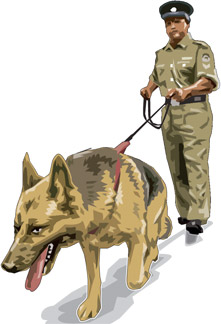 Living in complex times, laden with stress there were instances of
public complaints against the behaviour of a few officers, which
warranted the Police Human Rights Section to be set up in 2002. During
this journey of excellence, some officers were charged with malpractice
and corruption, sadly tarnishing the image and respect of the khaki
uniform which set the pace for a new Code of Ethics for Police Officers,
implemented by the National Police Commission. Living in complex times, laden with stress there were instances of
public complaints against the behaviour of a few officers, which
warranted the Police Human Rights Section to be set up in 2002. During
this journey of excellence, some officers were charged with malpractice
and corruption, sadly tarnishing the image and respect of the khaki
uniform which set the pace for a new Code of Ethics for Police Officers,
implemented by the National Police Commission.
The new Code will enhance the working atmosphere between Senior and
Junior officers based on mutual respect, and also emphasizes the need to
serve the public as a priority, without favour.
The Code of Ethics educates the cadre on the importance of
maintaining the rights of all citizens including arrested suspects.
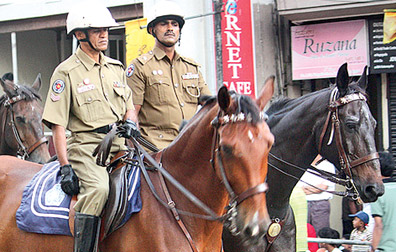 In the years ahead, the Service will face new demands as
international criminal elements spread their network in Asia, along with
other ideological religion based terror groups. In this present era of
peace, we must remember the officers who laid down their lives in the
line of duty. In the years ahead, the Service will face new demands as
international criminal elements spread their network in Asia, along with
other ideological religion based terror groups. In this present era of
peace, we must remember the officers who laid down their lives in the
line of duty.
The Police Service which today operates 439 stations island wide,
must continue to maintain its dignity and bond closer with the public,
as we Sri Lankans aspire to become a prosperous nation where the law
reigns supreme. |

